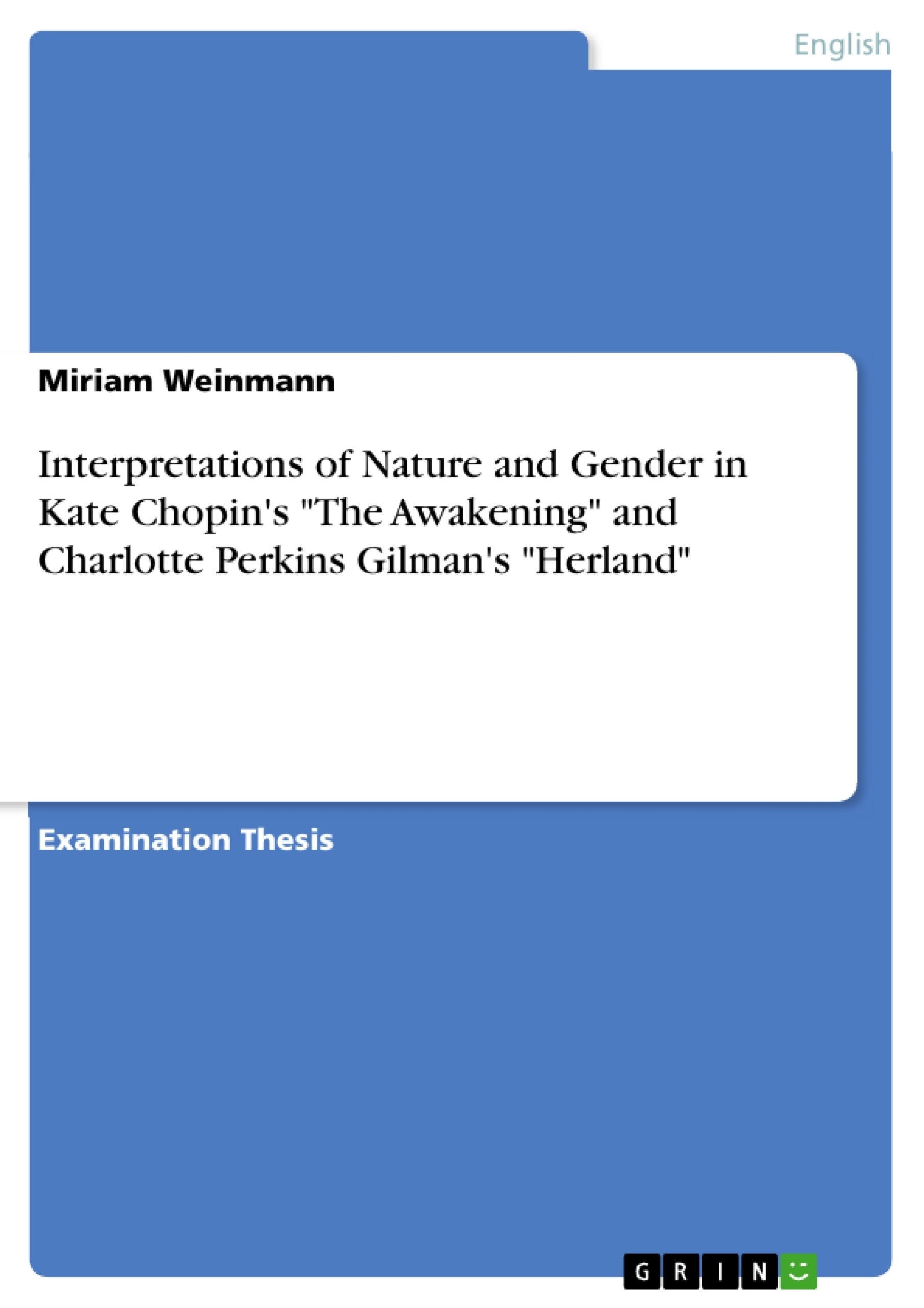The work analyzes the way Gilman and Chopin respectively deal with nature and gender in "Herland" and "The Awakening", as these subject matters are central to both works, and the issue of gender seems to superficially affiliate the works as both feminist works. The focuses are, firstly, on how they depict the different genders and portray their respective natures and, secondly, on what kind of relationship each of them devises between humans and nature, that is, the role they assign to nature in its different manifestations—its physical appearance and natural processes, as well as human’s inner nature—in each work. Moreover, the thesis points out contrasts between the respective depictions and provides explanations for these by drawing on personal convictions of Chopin and Gilman, as these are the key to achieving a full understanding of each of the works and of the respective underlying motivations. Thus, some of the authors’ differences in conviction are clarified, thereby distinguishing them from each other.
The first section provides important background information concerning prevalent convictions about the nature of the different genders in Chopin’s and Gilman’s time, as well as where those convictions originated in and how they affected men’s and women’s respective roles in American society then. To be familiar with this historical and cultural background is essential for a proper understanding of both works, as it constitutes the background on which both authors drew for "Herland" and "The Awakening", and to which both works can be understood as a reaction, albeit in different ways. In two subsequent sections, an analysis of each of the works with regard to the conception of nature and gender follows, and the final section deals with the said contrasts.
Inhaltsverzeichnis (Table of Contents)
- Introduction
- Conceptions about the Nature of the Different Genders in Nineteenth-Century American Society
- Nature and Gender in The Awakening
- Female Nature
- Male Nature
- The Role of Nature in its Physical Appearances and Natural Processes
- The Role of Human's Inner Nature
- Nature and Gender in Herland
- Female Nature
- Male Nature
- The Role of Nature in its Physical Appearances and Natural Processes
- The Role of Human's Inner Nature
- Contrasts between the Conception of Nature and Gender in The Awakening and Herland and their Rationales
- The Relationship between Humans and Nature
- Female Nature in General
- Female Sexuality
- The Relationship between Female and Male Nature
- Conclusion
Zielsetzung und Themenschwerpunkte (Objectives and Key Themes)
This thesis aims to analyze the portrayal of nature and gender in Charlotte Perkins Gilman's *Herland* and Kate Chopin's *The Awakening*. By exploring the authors' depictions of the different genders and their respective natures, the work examines the relationship between humans and nature within both novels. Additionally, it investigates the contrasts between their conceptions of nature and gender, providing explanations for these differences by drawing on the authors' personal convictions. Key themes explored include:- The impact of prevailing nineteenth-century conceptions of gender on the portrayal of female and male nature in the works of Chopin and Gilman
- The role of nature in its physical manifestations and its influence on human behavior and societal norms
- The relationship between nature and culture, particularly as it relates to gender roles and expectations
- The authors' individual perspectives on female sexuality, freedom, and rebellion against societal constraints
- The potential for utopian societies that challenge traditional gender roles and hierarchies
Zusammenfassung der Kapitel (Chapter Summaries)
The introduction provides an overview of the two novels, *Herland* and *The Awakening*, and their significance as feminist works. It highlights the commonalities and differences in the authors' motivations and philosophies, emphasizing the need for a nuanced understanding of each work. The chapter concludes by outlining the thesis's structure and focus.
The second chapter delves into the prevalent conceptions of gender in nineteenth-century American society, examining how stereotypes, roles, and restrictions were grounded in biological determinism. The chapter traces the historical roots of these conceptions, highlighting the influence of the nature/culture dichotomy and its impact on the perception of men and women.
The subsequent chapters focus on the depiction of nature and gender within each novel. The analysis of *The Awakening* explores Chopin's portrayal of female nature, male nature, and the role of nature in the protagonist's awakening and rebellion. Similarly, the chapter on *Herland* analyzes Gilman's depiction of a utopian society inhabited solely by women, examining their unique relationship with nature and their views on gender roles.
The final chapter delves into the contrasts between Chopin and Gilman's conceptions of nature and gender, analyzing their respective perspectives on the relationship between humans and nature, female nature, female sexuality, and the relationship between female and male nature. The chapter aims to provide a comprehensive understanding of the authors' distinct approaches and motivations.
Schlüsselwörter (Keywords)
The primary focus of this work is on the themes of nature, gender, and feminist critiques of societal norms. It explores key concepts including nature/culture dichotomy, female and male nature, gender roles and expectations, societal restrictions, female sexuality, and utopian visions. The analysis draws upon the works of Charlotte Perkins Gilman and Kate Chopin, specifically *Herland* and *The Awakening*, and utilizes their perspectives to understand the relationship between humans and nature in the context of gender. The work further investigates the historical and cultural background of nineteenth-century American society, shedding light on the prevalent conceptions of gender and their influence on the authors' writing.- Quote paper
- Miriam Weinmann (Author), 2009, Interpretations of Nature and Gender in Kate Chopin's "The Awakening" and Charlotte Perkins Gilman's "Herland", Munich, GRIN Verlag, https://www.grin.com/document/150988




